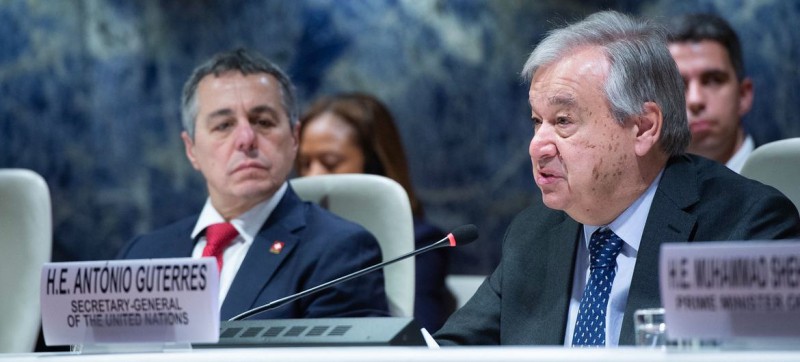Play video
UN Photo/Violaine Martin UN Secretary General António Guterres (right) attends the International Conference on Climate Resilient Pakistan, at Palais de Nations, in Geneva.
“If there is any doubt about loss and damage, go to Pakistan,” he told delegates at the International Conference on climate resilient Pakistan. “There is loss. There is damage. The devastation of climate change is real. From floods and droughts to cyclones and torrential rains. And as always, those countries least responsible, are the first to suffer.”
Tweet URL
33 million-plus impacted
More than 33 million people were affected by the flooding in Sindh and Balochistan, which is widely regarded to have been Pakistan’s greatest climate disaster.
Even today, months after the initial emergency, the floodwaters have only partly receded and the disaster is far from over for some eight million who were forced to flee the rising waters, which also killed more than 1,700 people.
Catastrophic damage
More than 2.2 million homes were destroyed along with 13 per cent of all health facilities, 4.4 million acres of crops, and more than 8,000 kilometres of roads and other vital infrastructure – including around 440 bridges.
The cost of helping communities hit in every conceivable way by the unprecedented monsoon rains in Pakistan that began last June, “will run in excess of $16 billion, and far more will be needed in the longer term”, the UN Secretary-General said.
Vulnerable children impacted
In parallel with the conference in Geneva, UN children’s fund UNICEF underlined the ongoing human cost of the emergency in Pakistan.
“Up to four million children are still living near contaminated and stagnant flood waters, risking their survival and wellbeing,” the UN agency said.
Acute respiratory infections had “skyrocketed” in areas affected by flooding, UNICEF continued, while the number of children suffering from severe acute malnutrition in the same areas nearly doubled between July and December, compared to 2021, leaving some 1.5 million youngsters still in need of lifesaving nutrition interventions.

UNICEF/UN0730552/Bashir On 3 November 2022 in Jacobabad, Sindh province, Pakistan, 15-year-old Sugra, whose home was destroyed in recent floods, holds her brother, Fayaz.
Paying over the odds
Reiterating the need to help developing countries such as Pakistan become more resilient to the impacts of climate change, the UN chief insisted that the international banking system needed reform “to right a fundamental wrong”.
He added: “Pakistan is doubly victimized by climate chaos and a morally bankrupt global financial system. That system routinely denies middle-income countries the debt relief and concessional funding needed to invest in resilience against natural disasters. And so, we need creative ways for developing countries to access debt relief and concessional financing when they need it the most.”
At Mr. Guterres’s side, Pakistan’s Prime Minister Muhammad Shehbaz Sharif explained why his country needed international solidarity now, more than ever.
“We need to get 33 million people who are deeply affected by the floods their future back,” he said. “Their families must stand on their feet and they must come back in life and earn their livelihood.”

UNICEF/Arsalan Butt UNICEF’s Chief of Field Office in Sindh – Prem Chand observes 11-year-old Rahman wear a jacket provided by UNICEF during the winter kits distribution in Mitho Babbar Village, Dadu District, Sindh province.
‘Tomorrow, we could be the ones’
Representing conference host country Switzerland, Federal Councillor for Foreign Affairs Ignazio Cassis, reasoned that supporting those countries impacted by natural disasters was enlightened common sense: “Today, it’s you, Pakistan, that needs help. But tomorrow, it could be us, all of us. One thing is certain: none of us is safe. We are all concerned by climate change, a global threat that requires a global response.”
Echoing that appeal for solidarity among nations, French President Emmanuel Macron joined the conference by video link to announce that €360 million had been pledged by France “to respond to the challenge of resilience rebuilding and climate adaptation”.
But the French President also noted that only 30 per cent of the UN’s emergency funding appeals had been provided, just as winter temperatures have plunged.
Profound change
UN Development Programme (UNDP) Administrator Achim Steiner highlighted the scale of the global threat posed by climate change and the relevance of the need to find climate adaptation funding for developing countries:
“Look to the east, in Australia, extraordinary flood events; look to the west in California, extreme weather events, look to Europe, and people are wondering what happened to snow in winter, we are living in profoundly changing times.”
Watch a joint press stakehout held by the UN Secretary-General and Prime Minister of Pakistan on the conference, below:




Comments are closed.